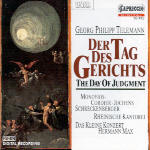This oratorio is one of Telemann’s later works and one of the most Handelian. It is less ornate and daring than the Thunder Ode (also recorded by these same forces for Capriccio), yet its choruses are grander and contain impressive writing for trumpets, horns, and timpani. The work is divided into four separate cantatas, or “Reflections”, as the composer calls them, in which the soloists take on character roles such as Unbelief, Reason, Religion, and Devotion. Jesus appears in section three and John is the main character in section four. The work ends in a blaze of glory as “The right hand of God is raised!” Of the soloists, Ann Monoyios and Wilfried Jochens stand out, though the others are good, too. As usual, conductor Hermann Max leads with precision and vigor, and the small chorus of 16 singers and the 24-piece chamber orchestra seem exceptionally well balanced. Recorded in a very resonant acoustic, these forces provide a large enough sound to make you believe a day of reckoning is happening, while being able to remain absolutely clear and precise about that fact. The soloists and continuo harpsichord are ideally balanced, which is not often the case in recordings of music from this period.
































